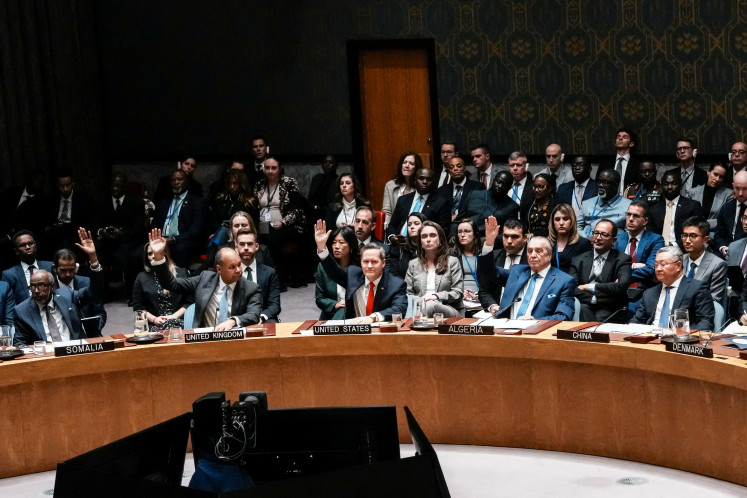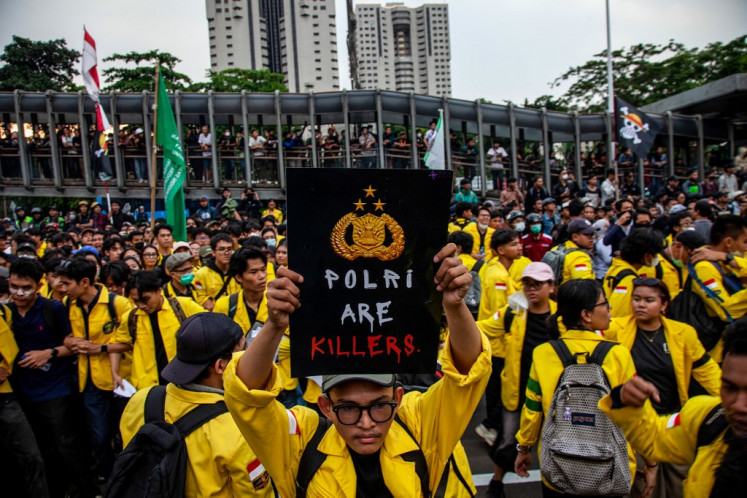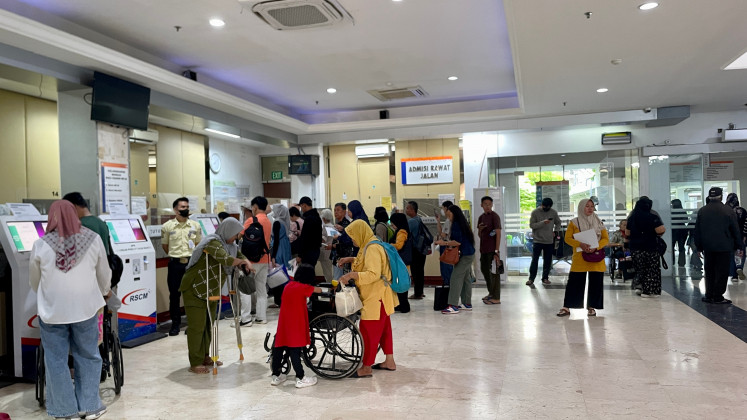Popular Reads
Top Results
Can't find what you're looking for?
View all search resultsPopular Reads
Top Results
Can't find what you're looking for?
View all search resultsDiscourse: UN Women calls for fight against harassment in workplaces
Phumzile-Mlambo-Ngcuka (UN Women)One year after the #MeToo movement broke out, victims of sexual violence are still struggling to have their voices heard
Change text size
Gift Premium Articles
to Anyone
Phumzile-Mlambo-Ngcuka (UN Women)
One year after the #MeToo movement broke out, victims of sexual violence are still struggling to have their voices heard. In the formal and non-formal workplace, many reports of sexual harassment are still dismissed for reasons that diminish the violations of the victims’ rights. Phumzile Mlambo-Ngcuka, executive director of UN Women and a South African politician, spoke to The Jakarta Post’s Rachmadea Aisyah about the effectiveness and evaluation of the #MeToo movement for working women. Here is the excerpt of the interview:
Question: How has the #MeToo movement helped people open their eyes about sexual and physical violence, particularly against women, a year after the movement gained traction?
Answer: The important mission of the #MeToo movement has been to expose the prevalence of sexual harassment and the fact that it can happen to anyone, regardless of any status, [being in] rich or poor country. And famous people can become victims, so it really is a universal problem.
And the fact that it is very frequent to the extent that in some situations it becomes normalized, [in] some workplace situations, you find someone who becomes a serial offender because they do it so many times; because they can and because nothing happens.
And if people know, you cannot have a senior executive harassing 20 people in the same company and no one knows about it. But it becomes [a way of life].
So #MeToo is the way to say, “‘Hell no, this is not normal.” This culture has to change and they have used it to their feasibility and affinity, to create the possibility for offenders to be held accountable. And that has been a very good because it is breaking the cultural silence but also it has addressed impunity.
It has not reached the point where we can say things to people around us, but it has started — [it is] something that tries to be sustainable and continuing.
Many of harassment cases reported under the hashtag #MeToo happened to women in the workplace. Do you think the lack of gender equality in the workplace has contributed to this phenomenon?
Certainly. It has happened at the workplace and in theory, the workplace is a regulated environment. So, you expect there to be rules and regulations that protect everyone equally, that sanitizes the work environment from these kinds of incidents, in the same way that the workplace has rules and regulations on how to protect the building from fire hazards — and it must protect everyone. It is everyone’s responsibility [...] in the building to make sure that the rules are [obeyed].
This one crime that happens at the work environment — for which you’d expect both the employers and the peers have a shared responsibility not to allow [sexual harassment] — happens without any consequences in most cases, which means the abdication of responsibility.
And because this is happening in the workplace, you therefore have to also not just put the blame on the perpetrator, but also on the conditions of service, which are the employers, human resources [department] — everybody has got to take responsibility for creating an environment that is not harmful to their colleagues.
Also, to the extent that most times, it is between someone who’s in power and someone who is a subordinate. It’s also about power relations. People find it easy to harass people that they have something to hold on — they can determine your promotion, salary. So, it is also abuse of power and people will not report it because they are afraid of the consequences, but also because it is so normalized and [the] victim is sometimes the one who is made to feel responsible and teased if they report [the abuse].
Survivors and victims do not report [the incident] because of fear, the stigma and the fact that they will not only get into trouble of victimization by the person they’re complaining against, but the whole work environment, including colleagues and employers, can go against them because they have ‘stepped on’ everyone else’s peace.
The culture in the workplace is still very much perpetrator-centric; much more sympathetic to their needs. The starting line is to look at the impacts this has on the perpetrator, expecting the victim to have capacity to accept things as they are.
And if the perpetrator is senior, the company is going to say, ‘Do not mess up our reputation’.
It is believed the #MeToo movement has not gained much traction in the developing, eastern part of the world, where people say there are a lot other more important issues to deal with, compared to in the developed, Western nations where it started. Do you think this has something to do with strong patriarchal values that are still found in labor and job markets in developing countries?
I think that is one of the answers. The East has a lot of other issues, so this issue competes with those in the emerging markets. And patriarchy is much stronger in developing countries. In developing countries, it is also much harder to talk about issues of sex and sexuality — the societies are more conservative.
So, it has not gained as much prominence, but that does not mean you should not try to push forward. You should take advantage of the fact that some of the companies are also multinational, so if they are fixed in one part of the world, we should urge them to do the same in the developing markets because that increases the number of entities that are taking action.
After this #MeToo movement, many working women around the world — especially those who are breadwinners of their family — are still afraid to stand up against harassment for fear of losing their livelihoods and being stigmatized, even though they are the victims. How do you suggest women deal with such a dilemma?
When this happens in the workplace, we should make sure that this is not just left to the woman; the employers have to take responsibility. We cannot make the individual woman be held responsible for turning around this very complex situation — [much too] complex for a single individual to deal with.
This is a responsibility and a task for the employer, who has the responsibility to provide a conducive work environment; it is the responsibility of the minister of labor or the ministry of employment to make sure that countries have protection in the workplace and that there’s compliance and consequences. It is an institutional and a societal responsibility to bring up the changes.
The women, the media — everybody needs to call on the broader society as well as employers to take responsibility. Customers and consumers must demand better from the people that they buy from. Board members and shareholders must demand better. It should not be left to the individual women to fend off for themselves.









